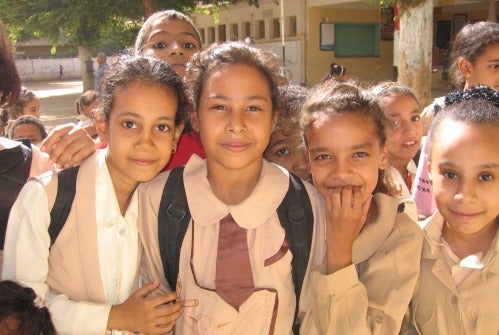 Back to school—back to the twin feelings of hope and fear. As the new school year begins, it brings hope for a better future for our children, and fears over what schools really offer them in terms of learning. Current statistics indicate that 50% of students with five years of schooling in Egypt cannot read or write, and 40% cannot do simple mathematics.
Back to school—back to the twin feelings of hope and fear. As the new school year begins, it brings hope for a better future for our children, and fears over what schools really offer them in terms of learning. Current statistics indicate that 50% of students with five years of schooling in Egypt cannot read or write, and 40% cannot do simple mathematics.
Serious, comprehensive reforms are desperately needed to save Egypt’s next generation, with a clear consensus (among education stakeholders) that a more holistic approach is required to create a paradigm shift in Egypt’s education system, one with a list of clear priorities:
(i) early childhood education to improve children’s school readiness; (ii) effective teaching, carried out in schools with better physical infrastructure; (iii) a more innovative curriculum; (iv) comprehensive student assessments; (v) effective skills development; and (vi) strong school governance with improvements in administration and accountability.
International experience has taught us that the first 1,000 days in a child’s life are the most crucial, a period where returns on investment—in health care, nutrition, development, and stimulation—can on average reach 17:1.
Thus, Early Childhood Education (ECE) should be everyone’s priority.
Early childhood education vital
Empirical evidence also strongly supports the idea that ECE has a positive impact on the lives of children in both the short- and long-term. In the short-term, it improves early cognitive development; in the long-term, it improves both cognitive and non-cognitive skills, including a child’s likelihood to stay in school, his or her educational attainment and future likelihood of finding employment, and even a child’s prospects for better health.
There a few important concepts associated with ECE being of benefit at all, however: namely, the quality of its service delivery and, more importantly, equity—in the sense that all children should have similar access to quality learning!
And while we acknowledge that recent progress has been made in terms of primary (elementary) and secondary (high school) enrollment in Egypt, we are also aware that, geographically, pre-primary enrollment rates in both Upper Egypt and frontier governorates lag behind those in other regions of the country.
Pre-primary rates of enrollment are also affected economically, with children from Egyptian families in the lowest wealth quintile lagging behind too. This triggers access-related and equity-related challenges for children from Egypt’s poorer regions, and from disadvantaged socio-economic groups.
Measures can be taken
If we wish to truly support the next generation in Egypt, we need to start implementing the following measures now:
- Establish conducive learning environments: Reach universal Kindergarten (KG) access for children, gradually, by having technical audits to ensure standards, introducing the use of pre-primary/post KG2 readiness assessment tools, and having costing plans and secure finances for physical infrastructure, human resources, and school materials.
- Expand equitable access: Expand access to ECE through new or rehabilitated KG classrooms in under-served areas, by training caregivers, teachers, and parents, and by using Public Private Partnerships. Adopt a community-oriented approach, both to engage parents and build up demand for ECE.
- Improve the quality of service delivery through scaling-up the adoption of better standards, partly by hiring qualified KG teachers and providing them with professional development programs, and by distributing learning and teaching kits.


Join the Conversation